Hospitality Operations and Management: A Report on Rosewood London
VerifiedAdded on 2020/12/09
|13
|3920
|326
Report
AI Summary
This report examines the operational and economic characteristics of hospitality operations, focusing on Rosewood London, a 5-star hotel. It delves into the nature of hospitality products and services, analyzing factors influencing demand patterns, customer profiles, and average spending power. The report explores key stages in product and service development, highlighting features that shape customer perception and opportunities and constraints within the hospitality environment. Furthermore, it covers various pricing methods, revenue generation factors, and performance measurement techniques, including both quantitative and qualitative appraisal approaches. The report provides a comprehensive overview of business analysis, evaluation, and planning relevant to the hospitality industry, offering valuable insights into operational management practices.
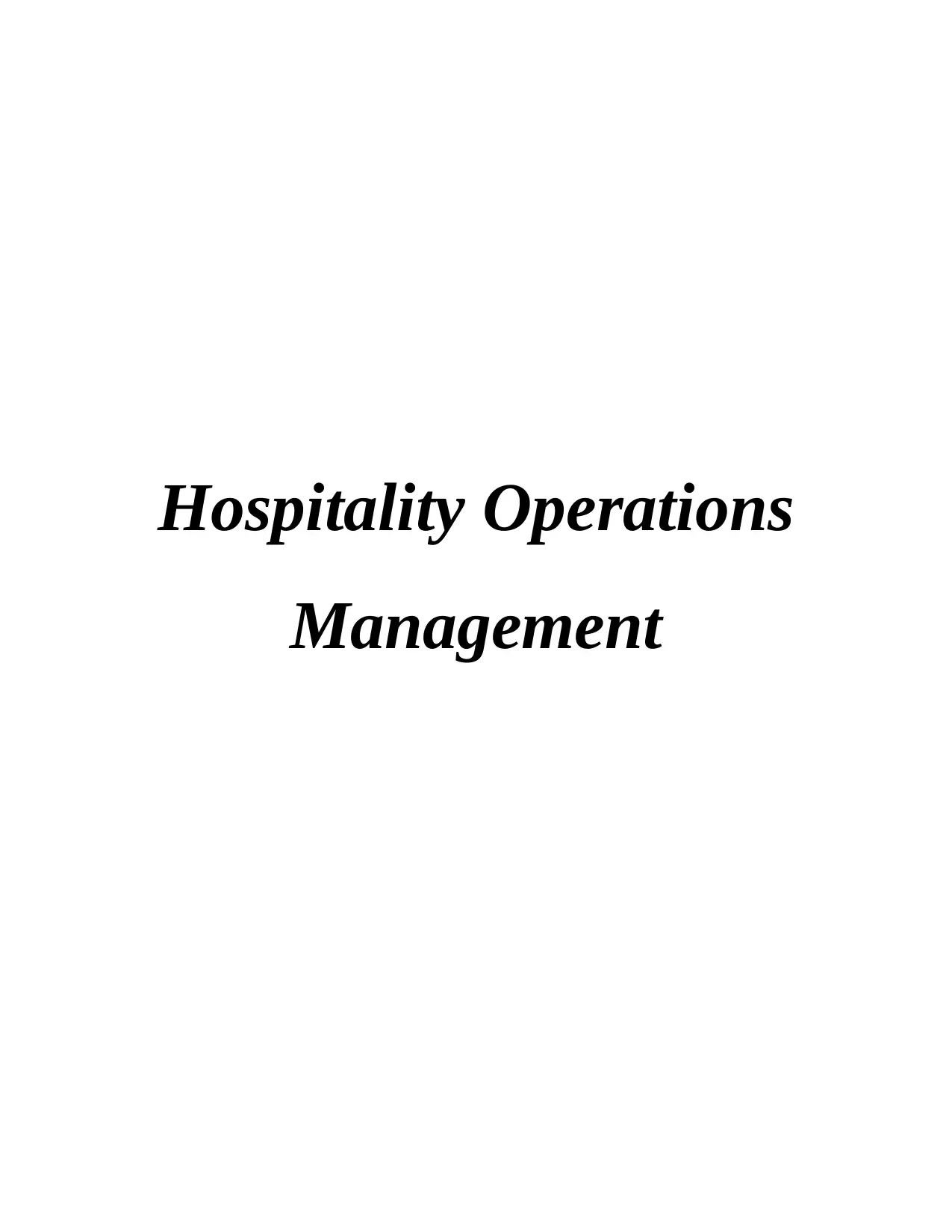
Hospitality Operations
Management
Management
Paraphrase This Document
Need a fresh take? Get an instant paraphrase of this document with our AI Paraphraser
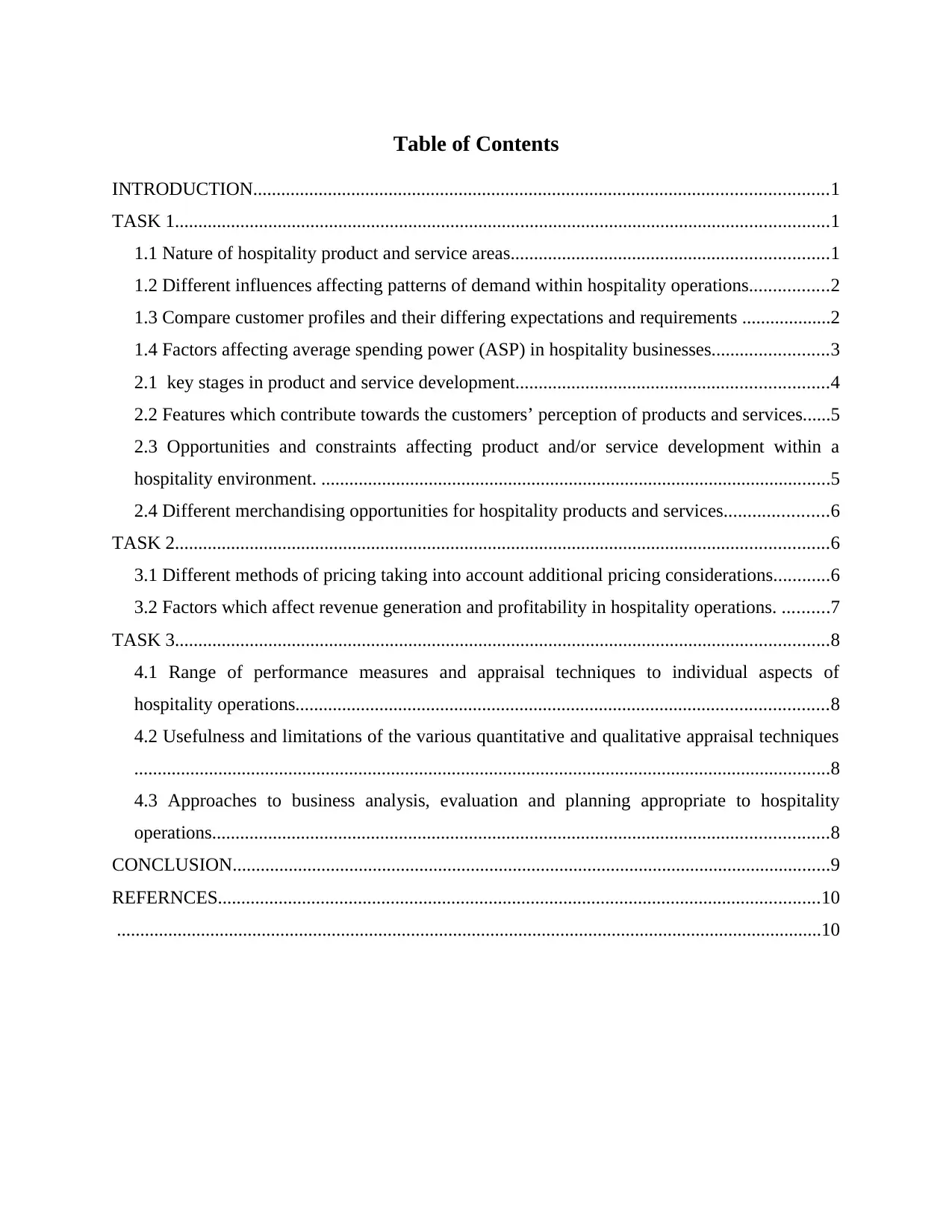
Table of Contents
INTRODUCTION...........................................................................................................................1
TASK 1............................................................................................................................................1
1.1 Nature of hospitality product and service areas....................................................................1
1.2 Different influences affecting patterns of demand within hospitality operations.................2
1.3 Compare customer profiles and their differing expectations and requirements ...................2
1.4 Factors affecting average spending power (ASP) in hospitality businesses.........................3
2.1 key stages in product and service development...................................................................4
2.2 Features which contribute towards the customers’ perception of products and services......5
2.3 Opportunities and constraints affecting product and/or service development within a
hospitality environment. .............................................................................................................5
2.4 Different merchandising opportunities for hospitality products and services......................6
TASK 2............................................................................................................................................6
3.1 Different methods of pricing taking into account additional pricing considerations............6
3.2 Factors which affect revenue generation and profitability in hospitality operations. ..........7
TASK 3............................................................................................................................................8
4.1 Range of performance measures and appraisal techniques to individual aspects of
hospitality operations..................................................................................................................8
4.2 Usefulness and limitations of the various quantitative and qualitative appraisal techniques
.....................................................................................................................................................8
4.3 Approaches to business analysis, evaluation and planning appropriate to hospitality
operations....................................................................................................................................8
CONCLUSION................................................................................................................................9
REFERNCES.................................................................................................................................10
.......................................................................................................................................................10
INTRODUCTION...........................................................................................................................1
TASK 1............................................................................................................................................1
1.1 Nature of hospitality product and service areas....................................................................1
1.2 Different influences affecting patterns of demand within hospitality operations.................2
1.3 Compare customer profiles and their differing expectations and requirements ...................2
1.4 Factors affecting average spending power (ASP) in hospitality businesses.........................3
2.1 key stages in product and service development...................................................................4
2.2 Features which contribute towards the customers’ perception of products and services......5
2.3 Opportunities and constraints affecting product and/or service development within a
hospitality environment. .............................................................................................................5
2.4 Different merchandising opportunities for hospitality products and services......................6
TASK 2............................................................................................................................................6
3.1 Different methods of pricing taking into account additional pricing considerations............6
3.2 Factors which affect revenue generation and profitability in hospitality operations. ..........7
TASK 3............................................................................................................................................8
4.1 Range of performance measures and appraisal techniques to individual aspects of
hospitality operations..................................................................................................................8
4.2 Usefulness and limitations of the various quantitative and qualitative appraisal techniques
.....................................................................................................................................................8
4.3 Approaches to business analysis, evaluation and planning appropriate to hospitality
operations....................................................................................................................................8
CONCLUSION................................................................................................................................9
REFERNCES.................................................................................................................................10
.......................................................................................................................................................10

⊘ This is a preview!⊘
Do you want full access?
Subscribe today to unlock all pages.

Trusted by 1+ million students worldwide
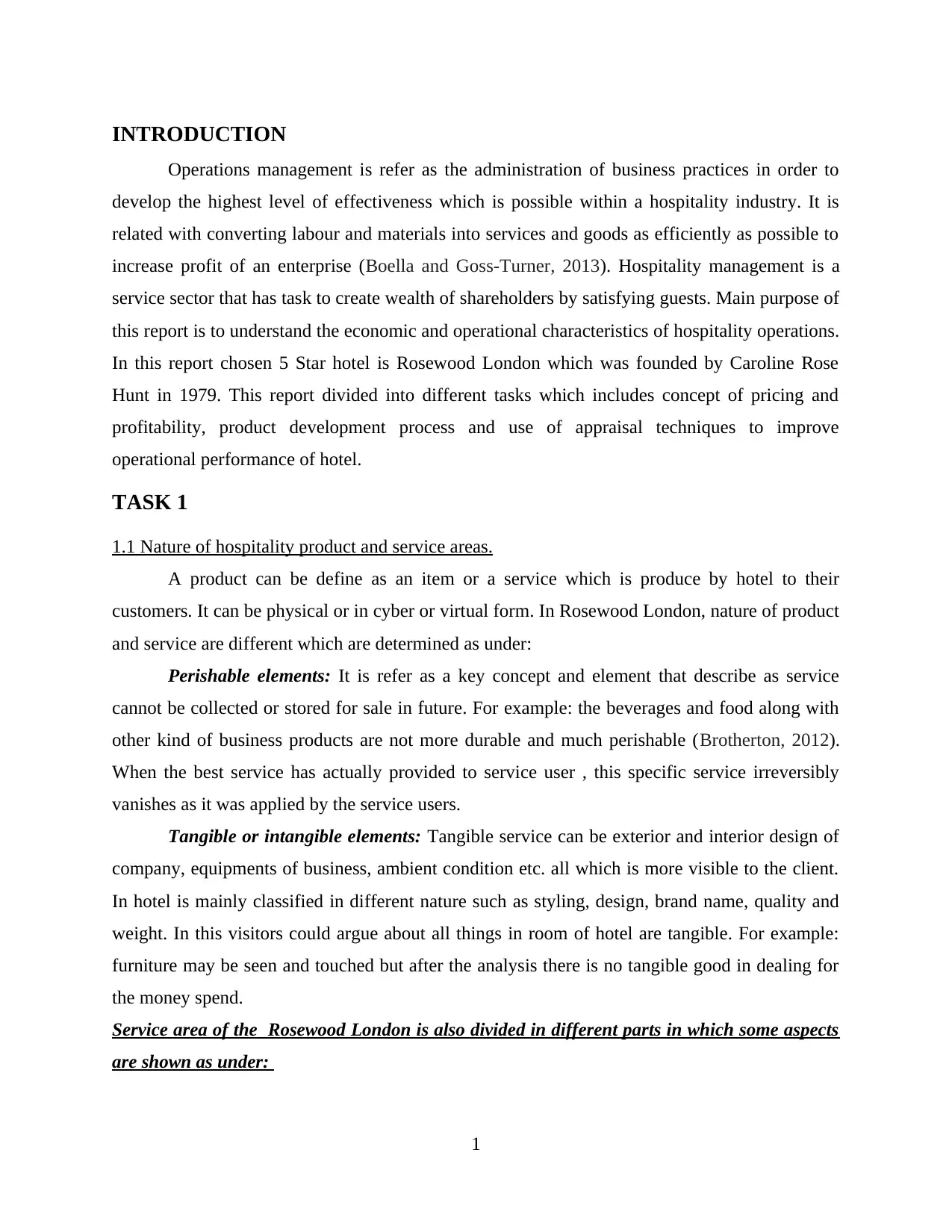
INTRODUCTION
Operations management is refer as the administration of business practices in order to
develop the highest level of effectiveness which is possible within a hospitality industry. It is
related with converting labour and materials into services and goods as efficiently as possible to
increase profit of an enterprise (Boella and Goss-Turner, 2013). Hospitality management is a
service sector that has task to create wealth of shareholders by satisfying guests. Main purpose of
this report is to understand the economic and operational characteristics of hospitality operations.
In this report chosen 5 Star hotel is Rosewood London which was founded by Caroline Rose
Hunt in 1979. This report divided into different tasks which includes concept of pricing and
profitability, product development process and use of appraisal techniques to improve
operational performance of hotel.
TASK 1
1.1 Nature of hospitality product and service areas.
A product can be define as an item or a service which is produce by hotel to their
customers. It can be physical or in cyber or virtual form. In Rosewood London, nature of product
and service are different which are determined as under:
Perishable elements: It is refer as a key concept and element that describe as service
cannot be collected or stored for sale in future. For example: the beverages and food along with
other kind of business products are not more durable and much perishable (Brotherton, 2012).
When the best service has actually provided to service user , this specific service irreversibly
vanishes as it was applied by the service users.
Tangible or intangible elements: Tangible service can be exterior and interior design of
company, equipments of business, ambient condition etc. all which is more visible to the client.
In hotel is mainly classified in different nature such as styling, design, brand name, quality and
weight. In this visitors could argue about all things in room of hotel are tangible. For example:
furniture may be seen and touched but after the analysis there is no tangible good in dealing for
the money spend.
Service area of the Rosewood London is also divided in different parts in which some aspects
are shown as under:
1
Operations management is refer as the administration of business practices in order to
develop the highest level of effectiveness which is possible within a hospitality industry. It is
related with converting labour and materials into services and goods as efficiently as possible to
increase profit of an enterprise (Boella and Goss-Turner, 2013). Hospitality management is a
service sector that has task to create wealth of shareholders by satisfying guests. Main purpose of
this report is to understand the economic and operational characteristics of hospitality operations.
In this report chosen 5 Star hotel is Rosewood London which was founded by Caroline Rose
Hunt in 1979. This report divided into different tasks which includes concept of pricing and
profitability, product development process and use of appraisal techniques to improve
operational performance of hotel.
TASK 1
1.1 Nature of hospitality product and service areas.
A product can be define as an item or a service which is produce by hotel to their
customers. It can be physical or in cyber or virtual form. In Rosewood London, nature of product
and service are different which are determined as under:
Perishable elements: It is refer as a key concept and element that describe as service
cannot be collected or stored for sale in future. For example: the beverages and food along with
other kind of business products are not more durable and much perishable (Brotherton, 2012).
When the best service has actually provided to service user , this specific service irreversibly
vanishes as it was applied by the service users.
Tangible or intangible elements: Tangible service can be exterior and interior design of
company, equipments of business, ambient condition etc. all which is more visible to the client.
In hotel is mainly classified in different nature such as styling, design, brand name, quality and
weight. In this visitors could argue about all things in room of hotel are tangible. For example:
furniture may be seen and touched but after the analysis there is no tangible good in dealing for
the money spend.
Service area of the Rosewood London is also divided in different parts in which some aspects
are shown as under:
1
Paraphrase This Document
Need a fresh take? Get an instant paraphrase of this document with our AI Paraphraser
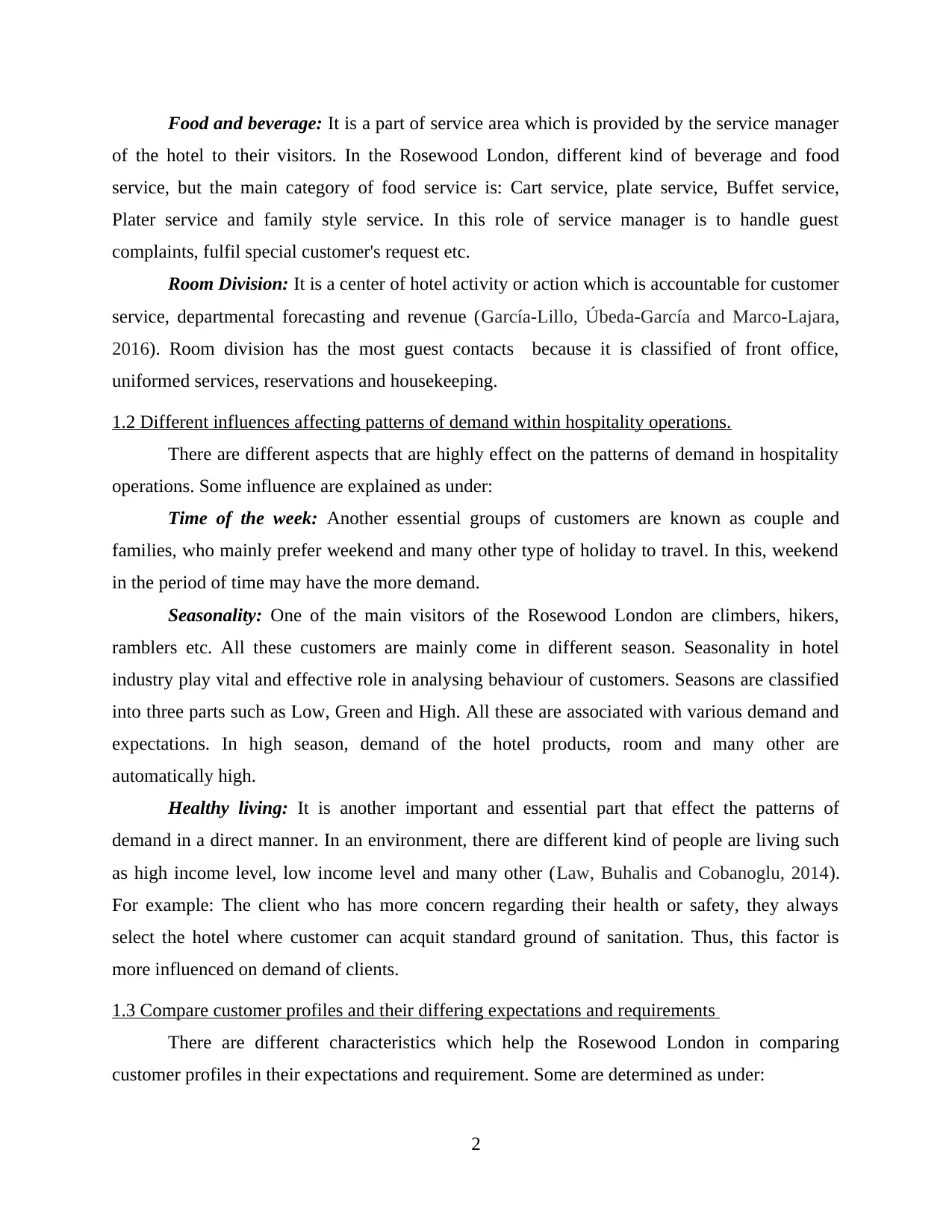
Food and beverage: It is a part of service area which is provided by the service manager
of the hotel to their visitors. In the Rosewood London, different kind of beverage and food
service, but the main category of food service is: Cart service, plate service, Buffet service,
Plater service and family style service. In this role of service manager is to handle guest
complaints, fulfil special customer's request etc.
Room Division: It is a center of hotel activity or action which is accountable for customer
service, departmental forecasting and revenue (García-Lillo, Úbeda-García and Marco-Lajara,
2016). Room division has the most guest contacts because it is classified of front office,
uniformed services, reservations and housekeeping.
1.2 Different influences affecting patterns of demand within hospitality operations.
There are different aspects that are highly effect on the patterns of demand in hospitality
operations. Some influence are explained as under:
Time of the week: Another essential groups of customers are known as couple and
families, who mainly prefer weekend and many other type of holiday to travel. In this, weekend
in the period of time may have the more demand.
Seasonality: One of the main visitors of the Rosewood London are climbers, hikers,
ramblers etc. All these customers are mainly come in different season. Seasonality in hotel
industry play vital and effective role in analysing behaviour of customers. Seasons are classified
into three parts such as Low, Green and High. All these are associated with various demand and
expectations. In high season, demand of the hotel products, room and many other are
automatically high.
Healthy living: It is another important and essential part that effect the patterns of
demand in a direct manner. In an environment, there are different kind of people are living such
as high income level, low income level and many other (Law, Buhalis and Cobanoglu, 2014).
For example: The client who has more concern regarding their health or safety, they always
select the hotel where customer can acquit standard ground of sanitation. Thus, this factor is
more influenced on demand of clients.
1.3 Compare customer profiles and their differing expectations and requirements
There are different characteristics which help the Rosewood London in comparing
customer profiles in their expectations and requirement. Some are determined as under:
2
of the hotel to their visitors. In the Rosewood London, different kind of beverage and food
service, but the main category of food service is: Cart service, plate service, Buffet service,
Plater service and family style service. In this role of service manager is to handle guest
complaints, fulfil special customer's request etc.
Room Division: It is a center of hotel activity or action which is accountable for customer
service, departmental forecasting and revenue (García-Lillo, Úbeda-García and Marco-Lajara,
2016). Room division has the most guest contacts because it is classified of front office,
uniformed services, reservations and housekeeping.
1.2 Different influences affecting patterns of demand within hospitality operations.
There are different aspects that are highly effect on the patterns of demand in hospitality
operations. Some influence are explained as under:
Time of the week: Another essential groups of customers are known as couple and
families, who mainly prefer weekend and many other type of holiday to travel. In this, weekend
in the period of time may have the more demand.
Seasonality: One of the main visitors of the Rosewood London are climbers, hikers,
ramblers etc. All these customers are mainly come in different season. Seasonality in hotel
industry play vital and effective role in analysing behaviour of customers. Seasons are classified
into three parts such as Low, Green and High. All these are associated with various demand and
expectations. In high season, demand of the hotel products, room and many other are
automatically high.
Healthy living: It is another important and essential part that effect the patterns of
demand in a direct manner. In an environment, there are different kind of people are living such
as high income level, low income level and many other (Law, Buhalis and Cobanoglu, 2014).
For example: The client who has more concern regarding their health or safety, they always
select the hotel where customer can acquit standard ground of sanitation. Thus, this factor is
more influenced on demand of clients.
1.3 Compare customer profiles and their differing expectations and requirements
There are different characteristics which help the Rosewood London in comparing
customer profiles in their expectations and requirement. Some are determined as under:
2
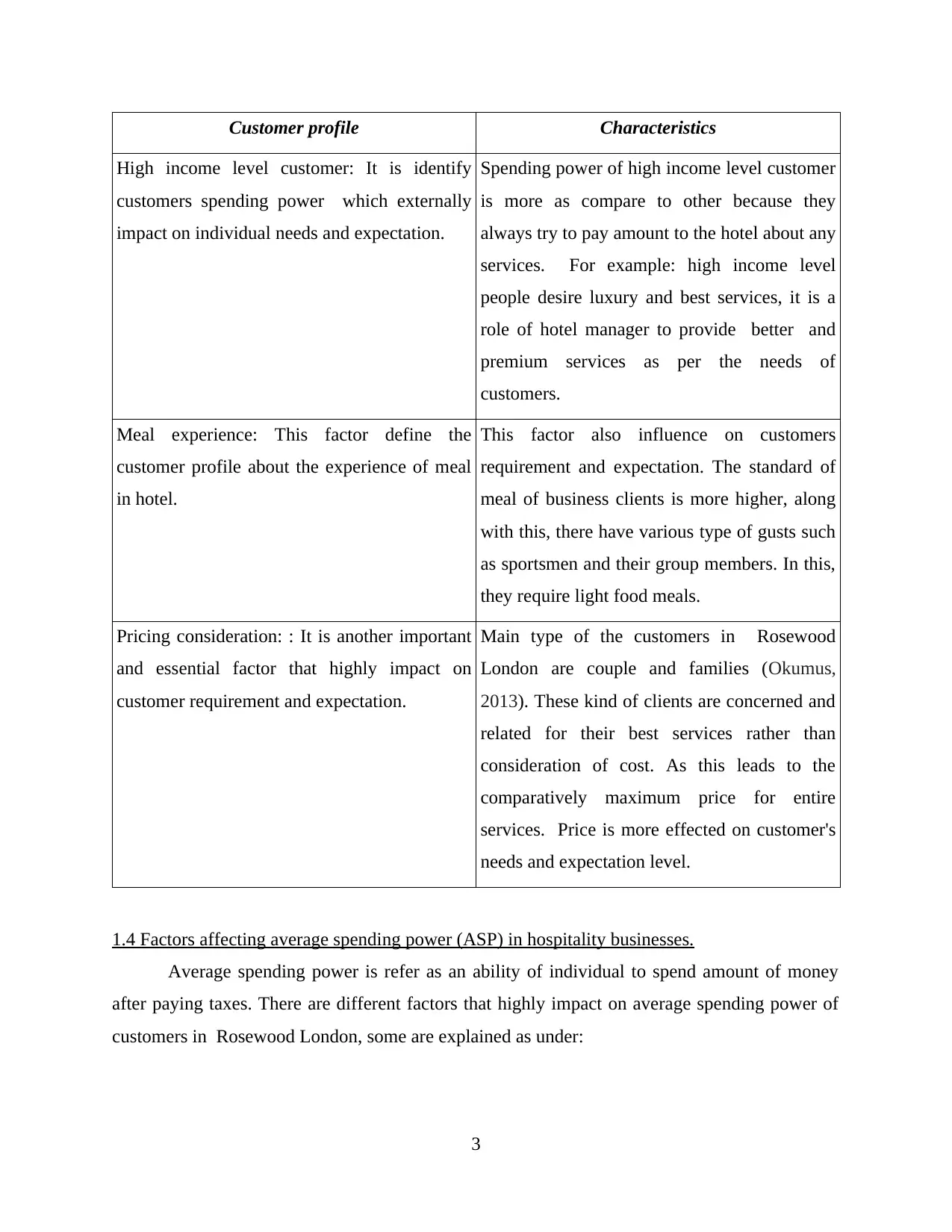
Customer profile Characteristics
High income level customer: It is identify
customers spending power which externally
impact on individual needs and expectation.
Spending power of high income level customer
is more as compare to other because they
always try to pay amount to the hotel about any
services. For example: high income level
people desire luxury and best services, it is a
role of hotel manager to provide better and
premium services as per the needs of
customers.
Meal experience: This factor define the
customer profile about the experience of meal
in hotel.
This factor also influence on customers
requirement and expectation. The standard of
meal of business clients is more higher, along
with this, there have various type of gusts such
as sportsmen and their group members. In this,
they require light food meals.
Pricing consideration: : It is another important
and essential factor that highly impact on
customer requirement and expectation.
Main type of the customers in Rosewood
London are couple and families (Okumus,
2013). These kind of clients are concerned and
related for their best services rather than
consideration of cost. As this leads to the
comparatively maximum price for entire
services. Price is more effected on customer's
needs and expectation level.
1.4 Factors affecting average spending power (ASP) in hospitality businesses.
Average spending power is refer as an ability of individual to spend amount of money
after paying taxes. There are different factors that highly impact on average spending power of
customers in Rosewood London, some are explained as under:
3
High income level customer: It is identify
customers spending power which externally
impact on individual needs and expectation.
Spending power of high income level customer
is more as compare to other because they
always try to pay amount to the hotel about any
services. For example: high income level
people desire luxury and best services, it is a
role of hotel manager to provide better and
premium services as per the needs of
customers.
Meal experience: This factor define the
customer profile about the experience of meal
in hotel.
This factor also influence on customers
requirement and expectation. The standard of
meal of business clients is more higher, along
with this, there have various type of gusts such
as sportsmen and their group members. In this,
they require light food meals.
Pricing consideration: : It is another important
and essential factor that highly impact on
customer requirement and expectation.
Main type of the customers in Rosewood
London are couple and families (Okumus,
2013). These kind of clients are concerned and
related for their best services rather than
consideration of cost. As this leads to the
comparatively maximum price for entire
services. Price is more effected on customer's
needs and expectation level.
1.4 Factors affecting average spending power (ASP) in hospitality businesses.
Average spending power is refer as an ability of individual to spend amount of money
after paying taxes. There are different factors that highly impact on average spending power of
customers in Rosewood London, some are explained as under:
3
⊘ This is a preview!⊘
Do you want full access?
Subscribe today to unlock all pages.

Trusted by 1+ million students worldwide
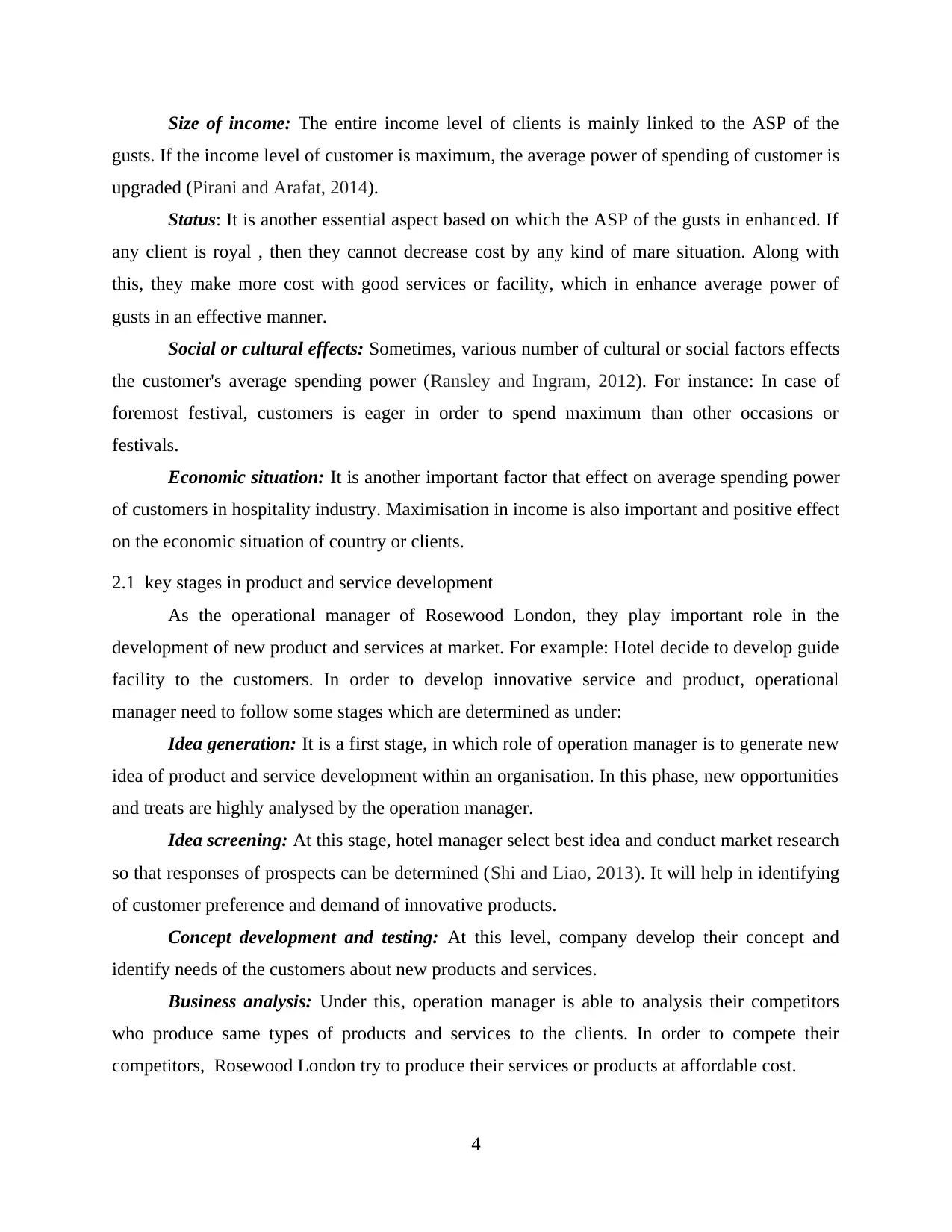
Size of income: The entire income level of clients is mainly linked to the ASP of the
gusts. If the income level of customer is maximum, the average power of spending of customer is
upgraded (Pirani and Arafat, 2014).
Status: It is another essential aspect based on which the ASP of the gusts in enhanced. If
any client is royal , then they cannot decrease cost by any kind of mare situation. Along with
this, they make more cost with good services or facility, which in enhance average power of
gusts in an effective manner.
Social or cultural effects: Sometimes, various number of cultural or social factors effects
the customer's average spending power (Ransley and Ingram, 2012). For instance: In case of
foremost festival, customers is eager in order to spend maximum than other occasions or
festivals.
Economic situation: It is another important factor that effect on average spending power
of customers in hospitality industry. Maximisation in income is also important and positive effect
on the economic situation of country or clients.
2.1 key stages in product and service development
As the operational manager of Rosewood London, they play important role in the
development of new product and services at market. For example: Hotel decide to develop guide
facility to the customers. In order to develop innovative service and product, operational
manager need to follow some stages which are determined as under:
Idea generation: It is a first stage, in which role of operation manager is to generate new
idea of product and service development within an organisation. In this phase, new opportunities
and treats are highly analysed by the operation manager.
Idea screening: At this stage, hotel manager select best idea and conduct market research
so that responses of prospects can be determined (Shi and Liao, 2013). It will help in identifying
of customer preference and demand of innovative products.
Concept development and testing: At this level, company develop their concept and
identify needs of the customers about new products and services.
Business analysis: Under this, operation manager is able to analysis their competitors
who produce same types of products and services to the clients. In order to compete their
competitors, Rosewood London try to produce their services or products at affordable cost.
4
gusts. If the income level of customer is maximum, the average power of spending of customer is
upgraded (Pirani and Arafat, 2014).
Status: It is another essential aspect based on which the ASP of the gusts in enhanced. If
any client is royal , then they cannot decrease cost by any kind of mare situation. Along with
this, they make more cost with good services or facility, which in enhance average power of
gusts in an effective manner.
Social or cultural effects: Sometimes, various number of cultural or social factors effects
the customer's average spending power (Ransley and Ingram, 2012). For instance: In case of
foremost festival, customers is eager in order to spend maximum than other occasions or
festivals.
Economic situation: It is another important factor that effect on average spending power
of customers in hospitality industry. Maximisation in income is also important and positive effect
on the economic situation of country or clients.
2.1 key stages in product and service development
As the operational manager of Rosewood London, they play important role in the
development of new product and services at market. For example: Hotel decide to develop guide
facility to the customers. In order to develop innovative service and product, operational
manager need to follow some stages which are determined as under:
Idea generation: It is a first stage, in which role of operation manager is to generate new
idea of product and service development within an organisation. In this phase, new opportunities
and treats are highly analysed by the operation manager.
Idea screening: At this stage, hotel manager select best idea and conduct market research
so that responses of prospects can be determined (Shi and Liao, 2013). It will help in identifying
of customer preference and demand of innovative products.
Concept development and testing: At this level, company develop their concept and
identify needs of the customers about new products and services.
Business analysis: Under this, operation manager is able to analysis their competitors
who produce same types of products and services to the clients. In order to compete their
competitors, Rosewood London try to produce their services or products at affordable cost.
4
Paraphrase This Document
Need a fresh take? Get an instant paraphrase of this document with our AI Paraphraser
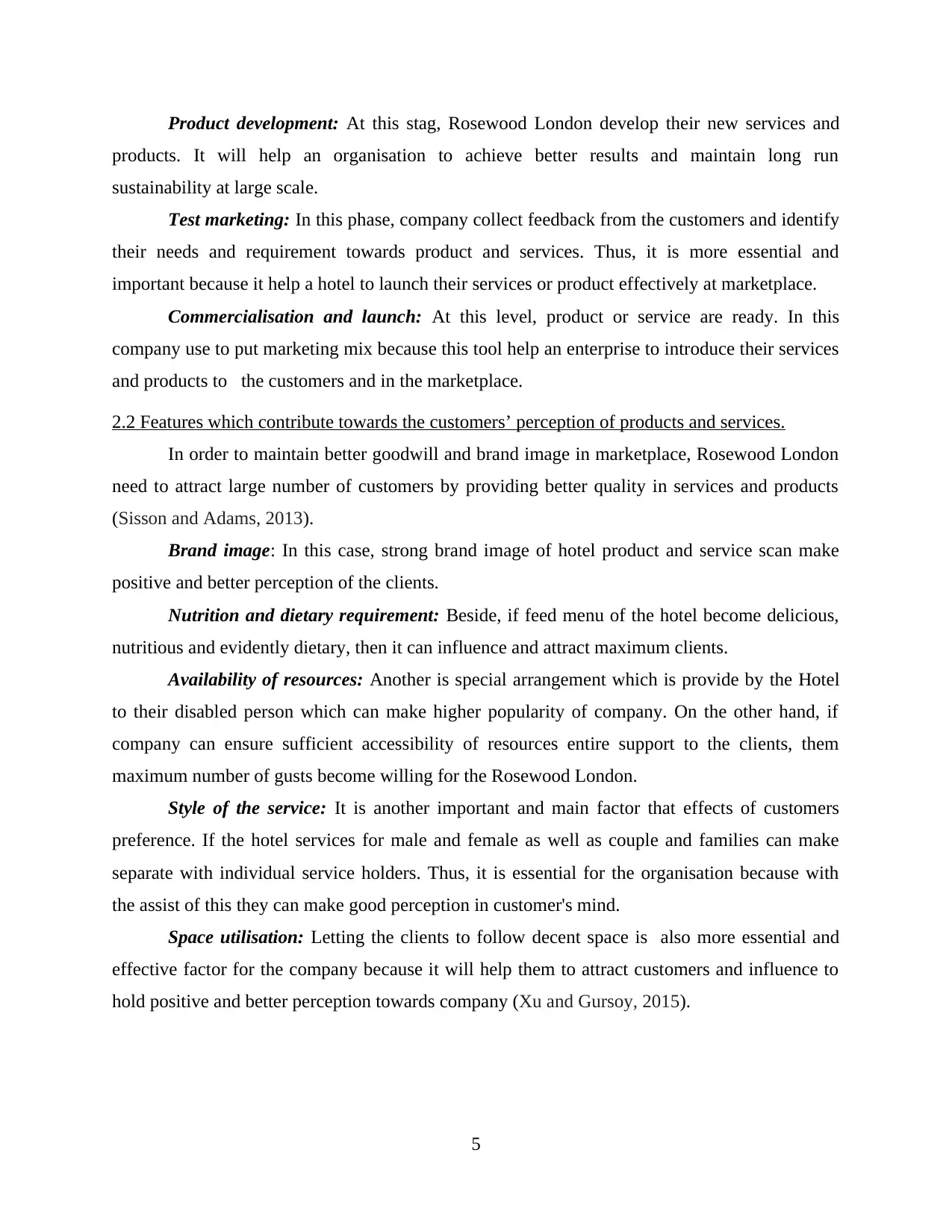
Product development: At this stag, Rosewood London develop their new services and
products. It will help an organisation to achieve better results and maintain long run
sustainability at large scale.
Test marketing: In this phase, company collect feedback from the customers and identify
their needs and requirement towards product and services. Thus, it is more essential and
important because it help a hotel to launch their services or product effectively at marketplace.
Commercialisation and launch: At this level, product or service are ready. In this
company use to put marketing mix because this tool help an enterprise to introduce their services
and products to the customers and in the marketplace.
2.2 Features which contribute towards the customers’ perception of products and services.
In order to maintain better goodwill and brand image in marketplace, Rosewood London
need to attract large number of customers by providing better quality in services and products
(Sisson and Adams, 2013).
Brand image: In this case, strong brand image of hotel product and service scan make
positive and better perception of the clients.
Nutrition and dietary requirement: Beside, if feed menu of the hotel become delicious,
nutritious and evidently dietary, then it can influence and attract maximum clients.
Availability of resources: Another is special arrangement which is provide by the Hotel
to their disabled person which can make higher popularity of company. On the other hand, if
company can ensure sufficient accessibility of resources entire support to the clients, them
maximum number of gusts become willing for the Rosewood London.
Style of the service: It is another important and main factor that effects of customers
preference. If the hotel services for male and female as well as couple and families can make
separate with individual service holders. Thus, it is essential for the organisation because with
the assist of this they can make good perception in customer's mind.
Space utilisation: Letting the clients to follow decent space is also more essential and
effective factor for the company because it will help them to attract customers and influence to
hold positive and better perception towards company (Xu and Gursoy, 2015).
5
products. It will help an organisation to achieve better results and maintain long run
sustainability at large scale.
Test marketing: In this phase, company collect feedback from the customers and identify
their needs and requirement towards product and services. Thus, it is more essential and
important because it help a hotel to launch their services or product effectively at marketplace.
Commercialisation and launch: At this level, product or service are ready. In this
company use to put marketing mix because this tool help an enterprise to introduce their services
and products to the customers and in the marketplace.
2.2 Features which contribute towards the customers’ perception of products and services.
In order to maintain better goodwill and brand image in marketplace, Rosewood London
need to attract large number of customers by providing better quality in services and products
(Sisson and Adams, 2013).
Brand image: In this case, strong brand image of hotel product and service scan make
positive and better perception of the clients.
Nutrition and dietary requirement: Beside, if feed menu of the hotel become delicious,
nutritious and evidently dietary, then it can influence and attract maximum clients.
Availability of resources: Another is special arrangement which is provide by the Hotel
to their disabled person which can make higher popularity of company. On the other hand, if
company can ensure sufficient accessibility of resources entire support to the clients, them
maximum number of gusts become willing for the Rosewood London.
Style of the service: It is another important and main factor that effects of customers
preference. If the hotel services for male and female as well as couple and families can make
separate with individual service holders. Thus, it is essential for the organisation because with
the assist of this they can make good perception in customer's mind.
Space utilisation: Letting the clients to follow decent space is also more essential and
effective factor for the company because it will help them to attract customers and influence to
hold positive and better perception towards company (Xu and Gursoy, 2015).
5
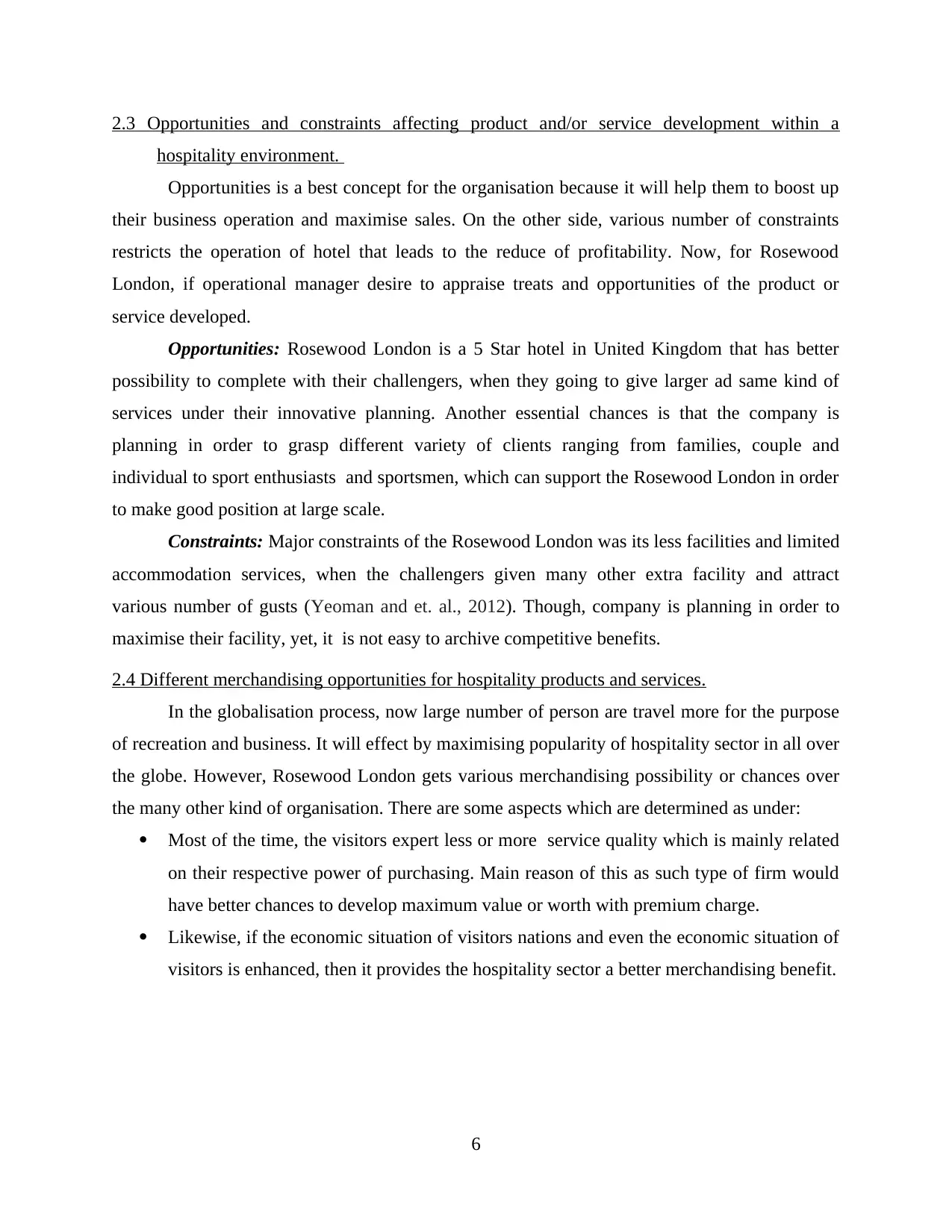
2.3 Opportunities and constraints affecting product and/or service development within a
hospitality environment.
Opportunities is a best concept for the organisation because it will help them to boost up
their business operation and maximise sales. On the other side, various number of constraints
restricts the operation of hotel that leads to the reduce of profitability. Now, for Rosewood
London, if operational manager desire to appraise treats and opportunities of the product or
service developed.
Opportunities: Rosewood London is a 5 Star hotel in United Kingdom that has better
possibility to complete with their challengers, when they going to give larger ad same kind of
services under their innovative planning. Another essential chances is that the company is
planning in order to grasp different variety of clients ranging from families, couple and
individual to sport enthusiasts and sportsmen, which can support the Rosewood London in order
to make good position at large scale.
Constraints: Major constraints of the Rosewood London was its less facilities and limited
accommodation services, when the challengers given many other extra facility and attract
various number of gusts (Yeoman and et. al., 2012). Though, company is planning in order to
maximise their facility, yet, it is not easy to archive competitive benefits.
2.4 Different merchandising opportunities for hospitality products and services.
In the globalisation process, now large number of person are travel more for the purpose
of recreation and business. It will effect by maximising popularity of hospitality sector in all over
the globe. However, Rosewood London gets various merchandising possibility or chances over
the many other kind of organisation. There are some aspects which are determined as under:
Most of the time, the visitors expert less or more service quality which is mainly related
on their respective power of purchasing. Main reason of this as such type of firm would
have better chances to develop maximum value or worth with premium charge.
Likewise, if the economic situation of visitors nations and even the economic situation of
visitors is enhanced, then it provides the hospitality sector a better merchandising benefit.
6
hospitality environment.
Opportunities is a best concept for the organisation because it will help them to boost up
their business operation and maximise sales. On the other side, various number of constraints
restricts the operation of hotel that leads to the reduce of profitability. Now, for Rosewood
London, if operational manager desire to appraise treats and opportunities of the product or
service developed.
Opportunities: Rosewood London is a 5 Star hotel in United Kingdom that has better
possibility to complete with their challengers, when they going to give larger ad same kind of
services under their innovative planning. Another essential chances is that the company is
planning in order to grasp different variety of clients ranging from families, couple and
individual to sport enthusiasts and sportsmen, which can support the Rosewood London in order
to make good position at large scale.
Constraints: Major constraints of the Rosewood London was its less facilities and limited
accommodation services, when the challengers given many other extra facility and attract
various number of gusts (Yeoman and et. al., 2012). Though, company is planning in order to
maximise their facility, yet, it is not easy to archive competitive benefits.
2.4 Different merchandising opportunities for hospitality products and services.
In the globalisation process, now large number of person are travel more for the purpose
of recreation and business. It will effect by maximising popularity of hospitality sector in all over
the globe. However, Rosewood London gets various merchandising possibility or chances over
the many other kind of organisation. There are some aspects which are determined as under:
Most of the time, the visitors expert less or more service quality which is mainly related
on their respective power of purchasing. Main reason of this as such type of firm would
have better chances to develop maximum value or worth with premium charge.
Likewise, if the economic situation of visitors nations and even the economic situation of
visitors is enhanced, then it provides the hospitality sector a better merchandising benefit.
6
⊘ This is a preview!⊘
Do you want full access?
Subscribe today to unlock all pages.

Trusted by 1+ million students worldwide
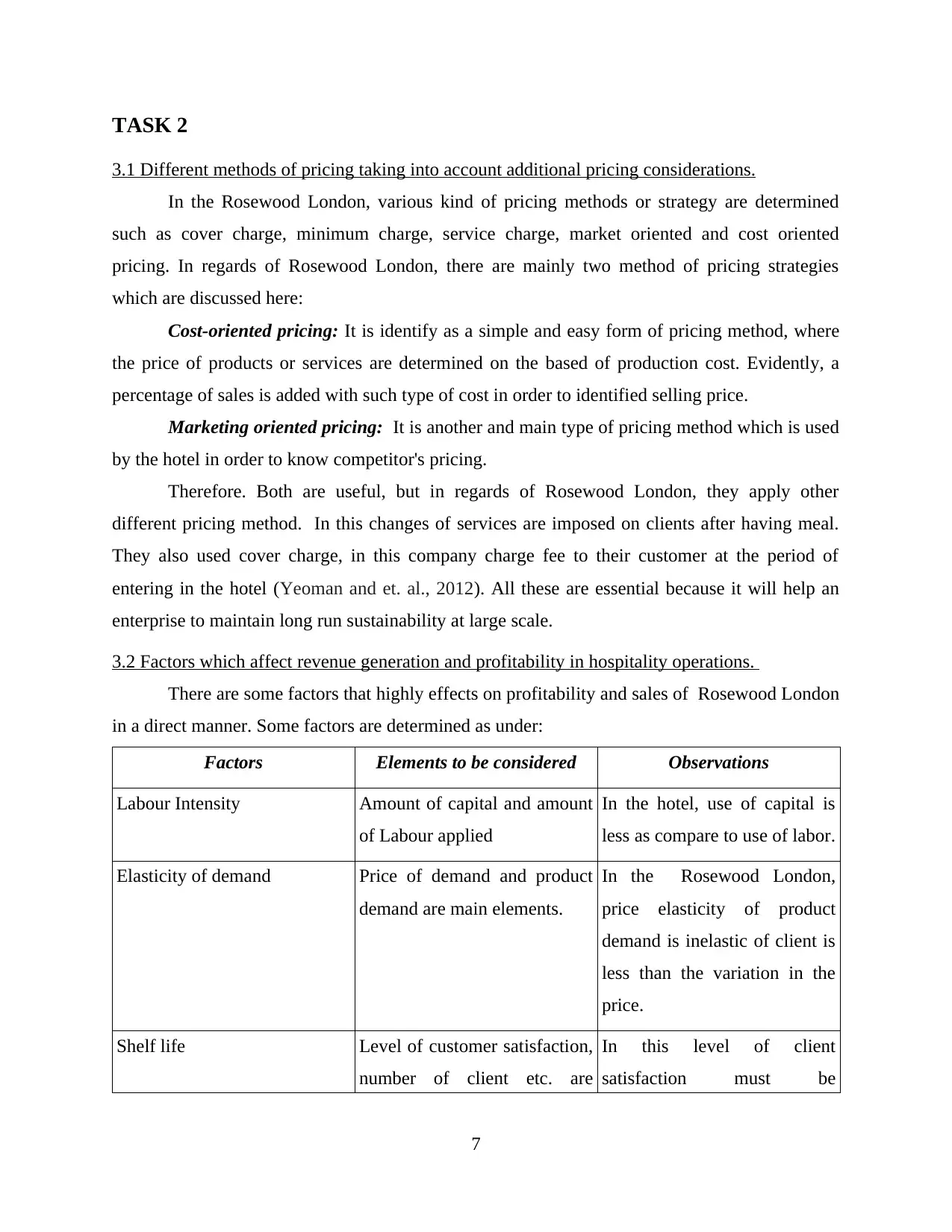
TASK 2
3.1 Different methods of pricing taking into account additional pricing considerations.
In the Rosewood London, various kind of pricing methods or strategy are determined
such as cover charge, minimum charge, service charge, market oriented and cost oriented
pricing. In regards of Rosewood London, there are mainly two method of pricing strategies
which are discussed here:
Cost-oriented pricing: It is identify as a simple and easy form of pricing method, where
the price of products or services are determined on the based of production cost. Evidently, a
percentage of sales is added with such type of cost in order to identified selling price.
Marketing oriented pricing: It is another and main type of pricing method which is used
by the hotel in order to know competitor's pricing.
Therefore. Both are useful, but in regards of Rosewood London, they apply other
different pricing method. In this changes of services are imposed on clients after having meal.
They also used cover charge, in this company charge fee to their customer at the period of
entering in the hotel (Yeoman and et. al., 2012). All these are essential because it will help an
enterprise to maintain long run sustainability at large scale.
3.2 Factors which affect revenue generation and profitability in hospitality operations.
There are some factors that highly effects on profitability and sales of Rosewood London
in a direct manner. Some factors are determined as under:
Factors Elements to be considered Observations
Labour Intensity Amount of capital and amount
of Labour applied
In the hotel, use of capital is
less as compare to use of labor.
Elasticity of demand Price of demand and product
demand are main elements.
In the Rosewood London,
price elasticity of product
demand is inelastic of client is
less than the variation in the
price.
Shelf life Level of customer satisfaction,
number of client etc. are
In this level of client
satisfaction must be
7
3.1 Different methods of pricing taking into account additional pricing considerations.
In the Rosewood London, various kind of pricing methods or strategy are determined
such as cover charge, minimum charge, service charge, market oriented and cost oriented
pricing. In regards of Rosewood London, there are mainly two method of pricing strategies
which are discussed here:
Cost-oriented pricing: It is identify as a simple and easy form of pricing method, where
the price of products or services are determined on the based of production cost. Evidently, a
percentage of sales is added with such type of cost in order to identified selling price.
Marketing oriented pricing: It is another and main type of pricing method which is used
by the hotel in order to know competitor's pricing.
Therefore. Both are useful, but in regards of Rosewood London, they apply other
different pricing method. In this changes of services are imposed on clients after having meal.
They also used cover charge, in this company charge fee to their customer at the period of
entering in the hotel (Yeoman and et. al., 2012). All these are essential because it will help an
enterprise to maintain long run sustainability at large scale.
3.2 Factors which affect revenue generation and profitability in hospitality operations.
There are some factors that highly effects on profitability and sales of Rosewood London
in a direct manner. Some factors are determined as under:
Factors Elements to be considered Observations
Labour Intensity Amount of capital and amount
of Labour applied
In the hotel, use of capital is
less as compare to use of labor.
Elasticity of demand Price of demand and product
demand are main elements.
In the Rosewood London,
price elasticity of product
demand is inelastic of client is
less than the variation in the
price.
Shelf life Level of customer satisfaction,
number of client etc. are
In this level of client
satisfaction must be
7
Paraphrase This Document
Need a fresh take? Get an instant paraphrase of this document with our AI Paraphraser
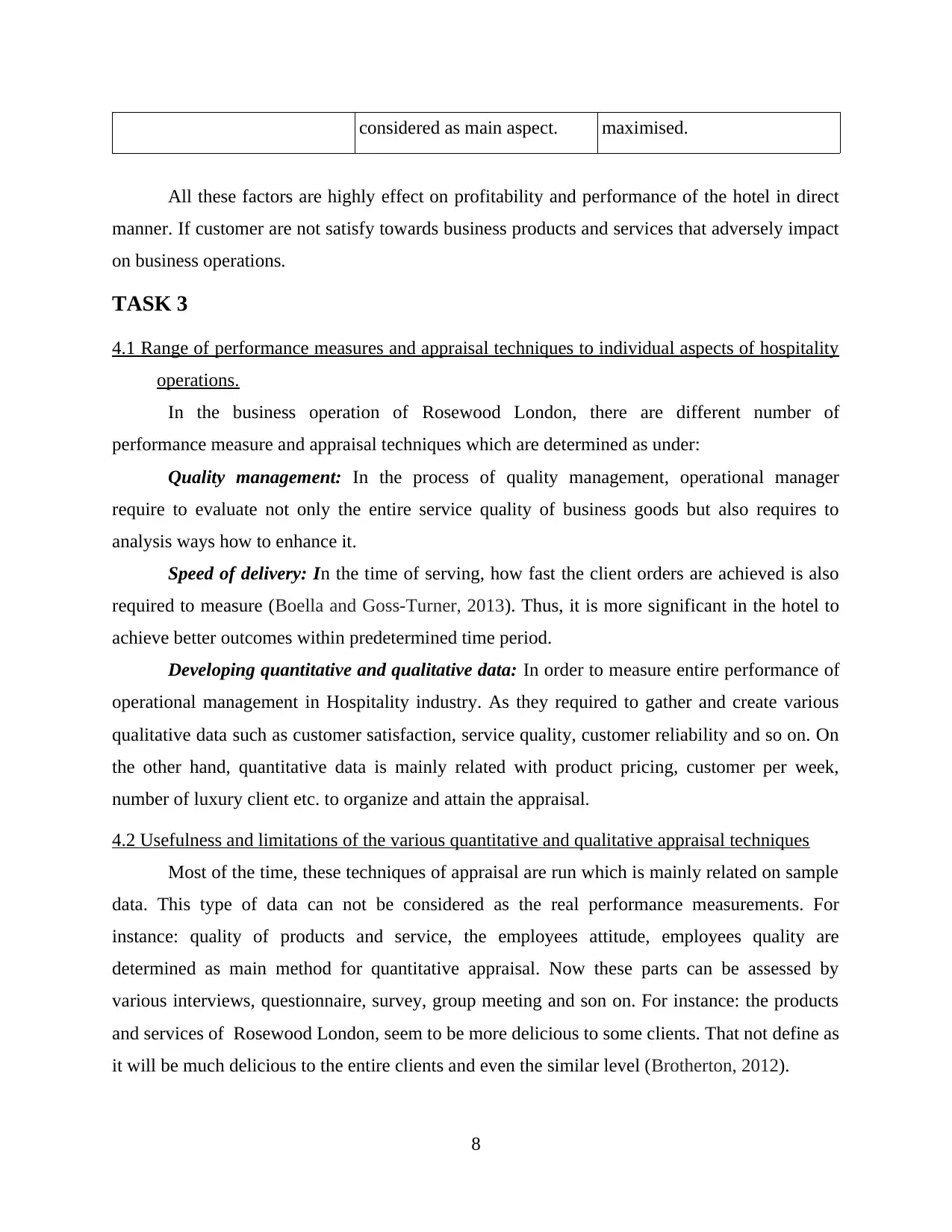
considered as main aspect. maximised.
All these factors are highly effect on profitability and performance of the hotel in direct
manner. If customer are not satisfy towards business products and services that adversely impact
on business operations.
TASK 3
4.1 Range of performance measures and appraisal techniques to individual aspects of hospitality
operations.
In the business operation of Rosewood London, there are different number of
performance measure and appraisal techniques which are determined as under:
Quality management: In the process of quality management, operational manager
require to evaluate not only the entire service quality of business goods but also requires to
analysis ways how to enhance it.
Speed of delivery: In the time of serving, how fast the client orders are achieved is also
required to measure (Boella and Goss-Turner, 2013). Thus, it is more significant in the hotel to
achieve better outcomes within predetermined time period.
Developing quantitative and qualitative data: In order to measure entire performance of
operational management in Hospitality industry. As they required to gather and create various
qualitative data such as customer satisfaction, service quality, customer reliability and so on. On
the other hand, quantitative data is mainly related with product pricing, customer per week,
number of luxury client etc. to organize and attain the appraisal.
4.2 Usefulness and limitations of the various quantitative and qualitative appraisal techniques
Most of the time, these techniques of appraisal are run which is mainly related on sample
data. This type of data can not be considered as the real performance measurements. For
instance: quality of products and service, the employees attitude, employees quality are
determined as main method for quantitative appraisal. Now these parts can be assessed by
various interviews, questionnaire, survey, group meeting and son on. For instance: the products
and services of Rosewood London, seem to be more delicious to some clients. That not define as
it will be much delicious to the entire clients and even the similar level (Brotherton, 2012).
8
All these factors are highly effect on profitability and performance of the hotel in direct
manner. If customer are not satisfy towards business products and services that adversely impact
on business operations.
TASK 3
4.1 Range of performance measures and appraisal techniques to individual aspects of hospitality
operations.
In the business operation of Rosewood London, there are different number of
performance measure and appraisal techniques which are determined as under:
Quality management: In the process of quality management, operational manager
require to evaluate not only the entire service quality of business goods but also requires to
analysis ways how to enhance it.
Speed of delivery: In the time of serving, how fast the client orders are achieved is also
required to measure (Boella and Goss-Turner, 2013). Thus, it is more significant in the hotel to
achieve better outcomes within predetermined time period.
Developing quantitative and qualitative data: In order to measure entire performance of
operational management in Hospitality industry. As they required to gather and create various
qualitative data such as customer satisfaction, service quality, customer reliability and so on. On
the other hand, quantitative data is mainly related with product pricing, customer per week,
number of luxury client etc. to organize and attain the appraisal.
4.2 Usefulness and limitations of the various quantitative and qualitative appraisal techniques
Most of the time, these techniques of appraisal are run which is mainly related on sample
data. This type of data can not be considered as the real performance measurements. For
instance: quality of products and service, the employees attitude, employees quality are
determined as main method for quantitative appraisal. Now these parts can be assessed by
various interviews, questionnaire, survey, group meeting and son on. For instance: the products
and services of Rosewood London, seem to be more delicious to some clients. That not define as
it will be much delicious to the entire clients and even the similar level (Brotherton, 2012).
8
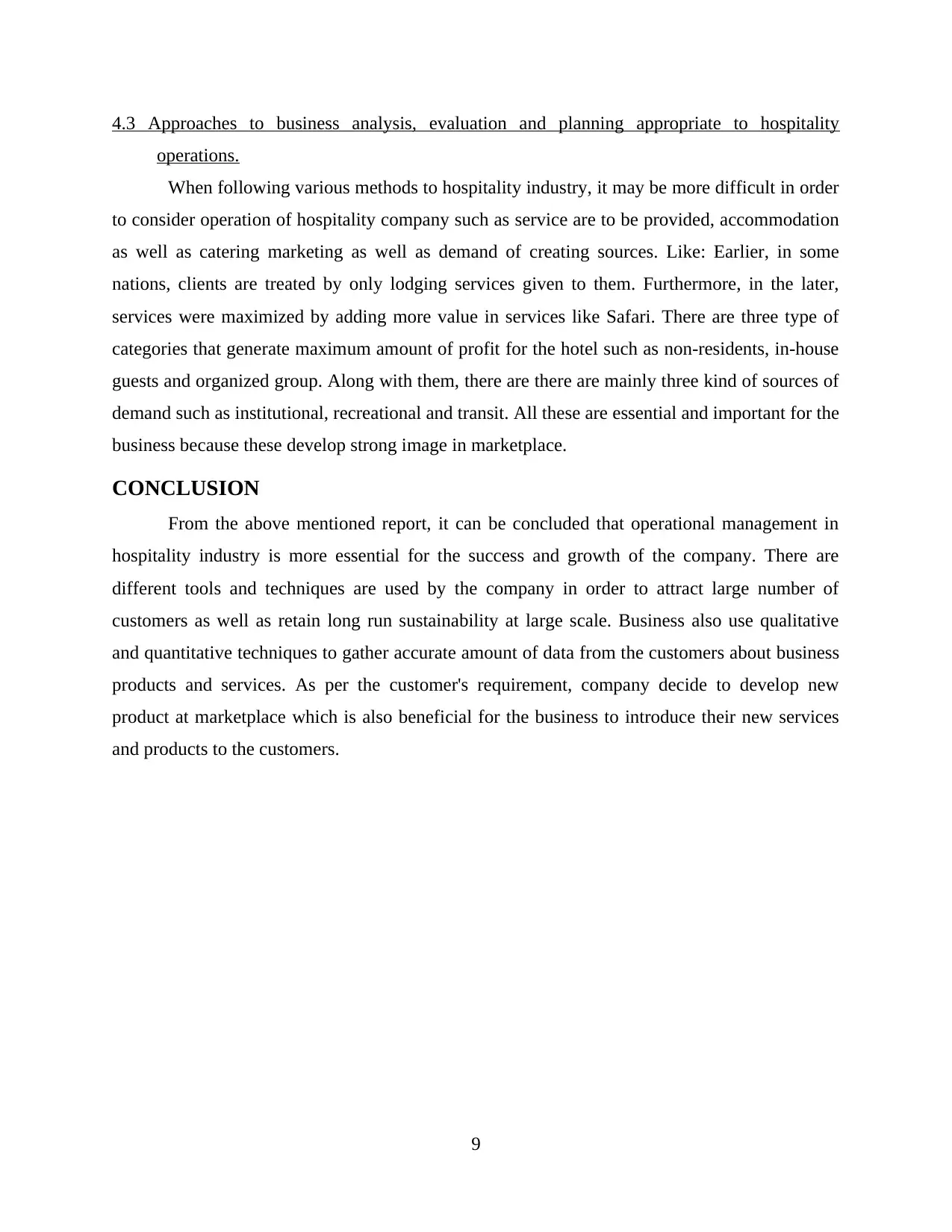
4.3 Approaches to business analysis, evaluation and planning appropriate to hospitality
operations.
When following various methods to hospitality industry, it may be more difficult in order
to consider operation of hospitality company such as service are to be provided, accommodation
as well as catering marketing as well as demand of creating sources. Like: Earlier, in some
nations, clients are treated by only lodging services given to them. Furthermore, in the later,
services were maximized by adding more value in services like Safari. There are three type of
categories that generate maximum amount of profit for the hotel such as non-residents, in-house
guests and organized group. Along with them, there are there are mainly three kind of sources of
demand such as institutional, recreational and transit. All these are essential and important for the
business because these develop strong image in marketplace.
CONCLUSION
From the above mentioned report, it can be concluded that operational management in
hospitality industry is more essential for the success and growth of the company. There are
different tools and techniques are used by the company in order to attract large number of
customers as well as retain long run sustainability at large scale. Business also use qualitative
and quantitative techniques to gather accurate amount of data from the customers about business
products and services. As per the customer's requirement, company decide to develop new
product at marketplace which is also beneficial for the business to introduce their new services
and products to the customers.
9
operations.
When following various methods to hospitality industry, it may be more difficult in order
to consider operation of hospitality company such as service are to be provided, accommodation
as well as catering marketing as well as demand of creating sources. Like: Earlier, in some
nations, clients are treated by only lodging services given to them. Furthermore, in the later,
services were maximized by adding more value in services like Safari. There are three type of
categories that generate maximum amount of profit for the hotel such as non-residents, in-house
guests and organized group. Along with them, there are there are mainly three kind of sources of
demand such as institutional, recreational and transit. All these are essential and important for the
business because these develop strong image in marketplace.
CONCLUSION
From the above mentioned report, it can be concluded that operational management in
hospitality industry is more essential for the success and growth of the company. There are
different tools and techniques are used by the company in order to attract large number of
customers as well as retain long run sustainability at large scale. Business also use qualitative
and quantitative techniques to gather accurate amount of data from the customers about business
products and services. As per the customer's requirement, company decide to develop new
product at marketplace which is also beneficial for the business to introduce their new services
and products to the customers.
9
⊘ This is a preview!⊘
Do you want full access?
Subscribe today to unlock all pages.

Trusted by 1+ million students worldwide
1 out of 13
Related Documents
Your All-in-One AI-Powered Toolkit for Academic Success.
+13062052269
info@desklib.com
Available 24*7 on WhatsApp / Email
![[object Object]](/_next/static/media/star-bottom.7253800d.svg)
Unlock your academic potential
Copyright © 2020–2025 A2Z Services. All Rights Reserved. Developed and managed by ZUCOL.





